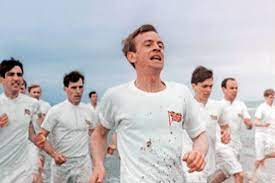Høj Puls
I love film
noir and “Body Heat” is very much noir. Sure, this is 1981, pictures are in
color and the dialogue (and the sex) is updated, but on every other level, this
is classic film noir as it was made in the forties and fifties. It is even
based on a noir classic, “Double Indemnity” to an extent where it is fair to call
it a remake.
We meet Ned
Racine (William Hurt), a not-so-great Florida lawyer who spends more time thinking
with his genitals that on his actual legal cases. This is a small town where
people know each other so Ned may be losing a case (again) in court to the
prosecutor Peter Lowenstein (Ted Danson), but he is still having a drink with
him in the local diner, swapping gossip.
One night, when
Ned is ready to move on to the next lay, he meets Matty Tyler Walker (Kathleen Turner).
She is a class or two above Ned’s usual prey, but he enjoys the challenge and somehow,
he does end up in her pants. Matty is home alone most of the week as her wealthy
husband does his business elsewhere and that is very convenient. Eventually
they come up with a scheme to kill her husband to clear him out of the way and
leaving his worldly possessions to Matty. That goes reasonably well, but then
things start going south. Ned learns from various sources that things are not
what he thinks they are, that he has been duped and is in danger himself. Matty
is one sneaky viper.
“Body Heat”
spends a rather long time setting up the pieces. It is slow and moody. There is
a sense of oppressive heat, and most scenes are shot at night with lighting
that creates a lot of shadow. All this is accompanied by a seductive, slow
score by John Barry. This is sexy stuff. So is the chemistry between Hurt and
Turner. It is a playful but sexually very loaded dialogue, maybe slightly too
racy for the original noir movies, but the meaning and intent is exactly the
same. We understand the sexual, dark energies involved here and if we were in
doubt, the love-making following leaves nothing in doubt. Very steamy. Not that
we really see that much, this is not porn, but that just makes it work even
stronger.
When we
come up to the murder, the movie changes gear. There is now not just a sexual
load but something a lot darker and as we see all this from Ned’s point of view,
we see how he struggles to keep afloat under this load. We thought we knew
Matty, but as a character she becomes more distant as Ned realizes how little
he actually knows about her and that is brilliantly done. We know Ned got into
this through his own flaws, but we still feel the disquiet, even panic as he
realizes he has been played as much as her husband did.
True to the
noir style, there are no happy endings. Human failings and a femme fatale will eventually
cause ruin and a few open ends is simply par for the course. This is exactly
how it should be.
It was a
pleasure to watch so many great actors at the early end of their careers.
William Hurt, Kathleen Turner, Ted Danson and Mickey Rourke just to mention
some of them. It is not one of those movies where the actors improvise their
roles, but instead it is more like a choreographed ballet where even the smallest
details are well considered. A remark, a glance, a hand gesture, everything is
loaded with meaning and the talent of both actors and direction is that it
never looks staged. Or at least no more staged than we feel we a diving into a forbidden
zone, developing into a nightmare.
An
interesting detail I learned from the extra material is that the heat we feel
is all fake. It was the coldest winter in memory in Florida and the actors were
all freezing profoundly while they had to act as if they were barely enduring
the heat. Now, that is the true illusion of cinema at work.
Is “Body
Heat” too much of a pastiche on film noir? Some might say so, but I am buying
it completely. I love it when directors are not afraid of using an old style or
theme for their movies. Especially when it is this well done. Recommended, but
probably not for children.



